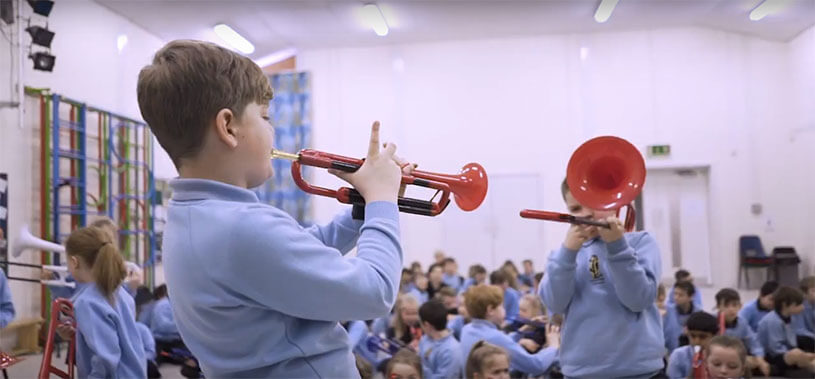Topics:
Search for topics or resources
Enter your search below and hit enter or click the search icon.

The benefits of integrating music into the primary school curriculum are far-reaching, and impact many areas of school life.
Warwick Music Group's Education Ambassador draws on their experience of managing music in a primary school and explores just some of the reasons why music is so important to include in your school environment.
There are many different reasons why music should be a part of the primary curriculum. Not least that every child enjoys music, whether it be the latest chart hit or the music that their parents listen to at home. It is a subject that is in everyone’s lives, making their favourite movie better or listening to the radio on the way to school.
Even if you leave aside the countless studies which list the benefits to children’s learning and attainment, some of which you can read about in our links later on in the page. Other benefits can include improvement in behaviour, morale and the confidence of the children.
Participating in a fun group activity each day can really help the class feel like a team, which can have a real impact on behaviour as a whole. Also having attainable goals, however small, can really boost confidence which, in turn can impact on behaviour as a whole.
There are many opportunities to connect with other schools through music, whether it be an inter-schools concert where you can show what you have been doing, or a Music Hub led day where schools that have been doing whole class music come together to play in a bigger venue. There are then celebrations on a larger scale which include ‘Young Voices’ where the school choir can come together with other to perform in arenas, or ‘Come and Play with The Halle’ for instrumental players.
Music is incredibly versatile and cross-curricular. To name a few you can go to Science, History, Geography, Art, Maths, English, the list is endless.
A great way to have music in the classroom every day is by singing. From singing the register to an end-of-day song, times tables or topic related. When you feel confident incorporating music into everyday life at school it may be time to investigate playing instruments, maybe peripatetic lessons or whole class tuition.
I have always been amazed at how the power of music can build children in ways other subjects can’t. From making them more engaged in other subjects to allowing shy children to perform as part of a band, choir or even by themselves with a real sense of achievement.
There are a number of studies that prove the impact that music can have on children at school.
It is a great planning tool to assess the children every term or so but if you don’t feel confident doing so without help there are some great online resources which tie in with the National Curriculum.
It is good to have some experience with reading and playing music if you are going to teach the children yourselves but if you are going to have a specialist music teacher come in the children often love that you are learning alongside them.
I have always found this to be the case, obviously, you need to choose your music carefully as not all songs are appropriate and can have the opposite effect. It can be a great talking point as well, discussing what the music is and who composed it, can they guess the composer?
Kate has always had a love for music and after starting to play the clarinet aged six went on to study music at the Royal Scottish Academy of Music and Drama. She joined Warwick Music Group in 2010 as Social Media Manager and now serves as Chief of Staff where her role is the day to day management of the team. She ensures activities are streamlined within the organisation, supporting the priorities of the business to help it grow. She now spends most of my spare time supporting my three children as they learn their own instruments!
Topics: